小学五年级英语知识点归纳
(完整版)小学五年级英语语法知识汇总
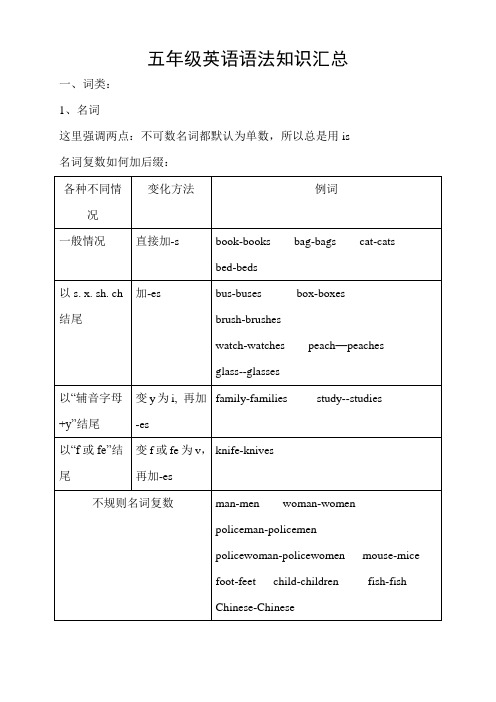
五年级英语语法知识汇总一、词类:1、名词这里强调两点:不可数名词都默认为单数,所以总是用is 名词复数如何加后缀:2、人称代词和物主代词人称代词:有主格和宾格之分。
一般动词前用主格,动词后用宾格。
3、指示代词4、冠词有a、an、the。
a和an的区别:an用于元音音素(一般就是元音字母a、e、i、o、u)前,a用于辅音音素前。
二、否定句:be动词(am、is、are)+not、情态动词can+ not、助动词(do、does)+ not如何将一个肯定的陈述句改为否定句:1、看句中有无be动词,如有,直接在be动词后+ not。
2、看句中有无情态动词,如有,直接在情态动词后+ not。
3、如上述二者都没有,就应用助动词+ not。
分四个步骤:(1)肯定陈述句中本来是没有助动词的,要加上去,位置在主语(某人或某物)后,动词前。
(2)确定助动词用do、does,根据句中动词,动词是原形的助动词就用do,动词是第三人称单数的助动词就用does,(3)在助动词后加not。
(4)原句中动词假如发生变化就要恢复成原形。
强调一点,有some的要考虑是否要用any。
三、一般疑问句。
如何将一个肯定的陈述句改为一般疑问句:1、看句中有无be动词,如有,把be动词提到句首即可。
2、看句中有无情态动词,如有,把情态动词提到句首即可。
3、如上述二者都没有,就应把助动提到句首。
分四个步骤:(1)肯定陈述句中本来是没有助动词的,要加上去,位置在主语(某人或某物)后,动词前。
(2)确定助动词用do还是does,根据句中动词,动词是原形的助动词就用do,动词是第三人称单数的助动词就用does(3)把助动词后提到句首。
(4)原句中动词假如发生变化就要恢复成原形。
强调一点,有some的要考虑是否要用any。
四、特殊疑问句。
表示疑问,有疑问词(在开头),回答有很多种可能。
常用疑问词:五、时态1、一般现在时(1)一般现在时中的be动词:一般用原形:am is aream用于第一人称单数(I);is用于第三人称单数(he she it和其他人名或称谓,如:Ben his sister等);are用于第二人称单数(you)和所有复数(包括第一人称复数we、第二人称复数you;第三人称复数they和其他复数,如the children 、his parents等)。
五年级英语语法知识点归纳
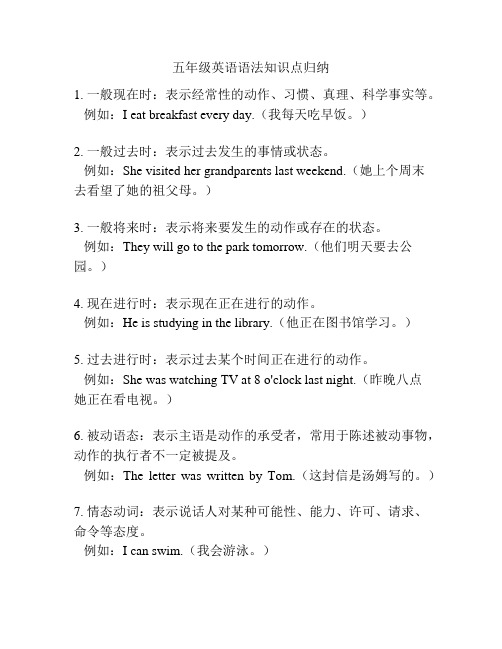
五年级英语语法知识点归纳1. 一般现在时:表示经常性的动作、习惯、真理、科学事实等。
例如:I eat breakfast every day.(我每天吃早饭。
)2. 一般过去时:表示过去发生的事情或状态。
例如:She visited her grandparents last weekend.(她上个周末去看望了她的祖父母。
)3. 一般将来时:表示将来要发生的动作或存在的状态。
例如:They will go to the park tomorrow.(他们明天要去公园。
)4. 现在进行时:表示现在正在进行的动作。
例如:He is studying in the library.(他正在图书馆学习。
)5. 过去进行时:表示过去某个时间正在进行的动作。
例如:She was watching TV at 8 o'clock last night.(昨晚八点她正在看电视。
)6. 被动语态:表示主语是动作的承受者,常用于陈述被动事物,动作的执行者不一定被提及。
例如:The letter was written by Tom.(这封信是汤姆写的。
)7. 情态动词:表示说话人对某种可能性、能力、许可、请求、命令等态度。
例如:I can swim.(我会游泳。
)8. 动词的时态变化:根据不同的时态,动词会发生相应的变化。
例如:go(一般现在时)→ goes(第三人称单数一般现在时)→ went(一般过去时)→ gone(过去分词)9. 形容词的比较级和最高级:用于比较两个或更多事物的大小、程度等。
例如:My sister is taller than me.(我姐姐比我高。
)10. 介词:用于表示事物之间的位置、关系等。
例如:The pen is on the table.(笔在桌子上。
)11. 不定代词:表达不确定或泛指的代词。
例如:Somebody called you.(有人给你打电话。
)12. 句子的结构:主语+谓语+宾语,疑问句的谓语和助动词需要进行调换。
小学五年级英语上册知识点归纳及练习
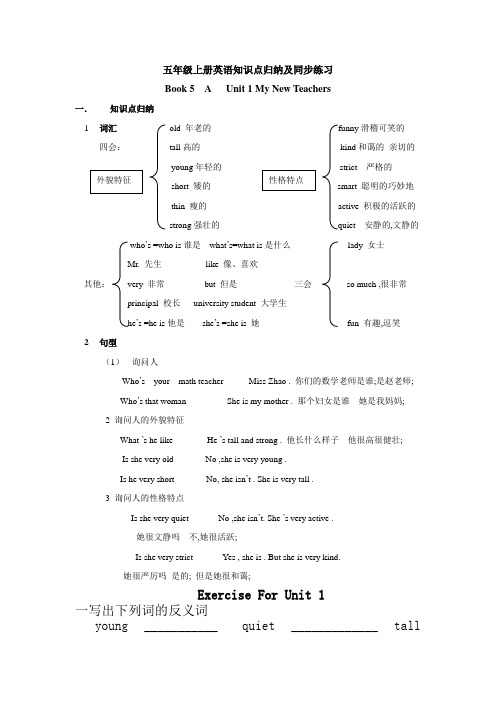
五年级上册英语知识点归纳及同步练习Book 5 A Unit 1 My New Teachers一. 知识点归纳1 词汇old 年老的funny 滑稽可笑的四会: tall 高的 kind 和蔼的 亲切的young 年轻的 strict 严格的short 矮的 smart 聪明的巧妙地thin 瘦的 active 积极的活跃的strong 强壮的 quiet 安静的,文静的who ’s =who is 谁是 what ’s=what is 是什么 lady 女士Mr. 先生 like 像、喜欢其他: very 非常 but 但是 三会 so much ,很非常principal 校长 university student 大学生he ’s =he is 他是 she ’s =she is 她 fun 有趣,逗笑2 句型(1) 询问人----- Who ’s your math teacher ----- Miss Zhao . 你们的数学老师是谁;是赵老师;-----Who ’s that woman -----She is my mother . 那个妇女是谁 她是我妈妈;2 询问人的外貌特征-----What ’s he like ----- He ’s tall and strong . 他长什么样子 他很高很健壮;----- Is she very old -----No ,she is very young .-----Is he very short -----No, she isn ’t . She is very tall .3 询问人的性格特点----- Is she very quiet ----- No ,she isn ’t. She ’s very active .她很文静吗 不,她很活跃;----- Is she very strict ----- Yes , she is . But she is very kind.她很严厉吗 是的; 但是她很和蔼; Exercise For Unit 1一写出下列词的反义词young ___________ quiet _____________ tall___________strong _________ new ___________ long _________ strict _____________二填上适当的单词使句子完整通顺;1 A: ___________ is the girlB: ___________ my sister .3A; _______ Tom’s father likeB: _________ __________ thin and quiet.4A: Is your English teacher _________B: No, she _________ . She is short . _________ she is pretty.4:Mr. Ma is not young .He is __________.5Miss Zhao is our math teacher . She is very ________ .But she is very kind .三补全对话1 A:___________________________________________ B: I’m fine .Thank you .A: ___________________________________________ B: She is my sister .A: ___________________________________________ B: No ,___________________ . She is very active .2 A: ___________________________________________ B: Miss White is my English teacher .A: ___________________________________________ B: She is very tall and thin .A:____________________________________________ B: Yes , she is very young .A: ____________________________________________ B: Yes ,___________________ .But she is very kind. 四根据所给的信息完成句子;1 What is man like 高个 ,瘦_________________________________________.2 Is your English teacher very active 文静的___________________________________________.3 Who’s that old woman 校长_________________________________________ .4 Is Tom very thin 强壮__________________________________________.Book 5A Unit 2 My days of the week一、本单元知识重点:词汇Monday Mon.星期一Chinese 语文Tuesday Tue. 星期二math数学Wednesday Wed.星期三subject English英语week Thursday Thu.星期四科目art美术Friday Fri.星期五music音乐Saturday Sat.星期六. 体育Sunday Sun.星期日science自然科学do homework做家庭作业do housework做家务事watch TV看电视read books 读书play ping-pong打乒乓球on Saturday 在星期六What abou t……怎么样play computer games玩电脑游戏day天have有;吃too 也;太on在…时候句型1.本单单元重点学习怎样问星期及怎样回答;今天是星期几What day is it today今天是星期一;It’s Monday.2.问星期的某天常干什么事及回答;你星期六常干什么What do you often do on Saturday我常做家庭作业.I often do homework.你们星期三常上些什么课What do you have on Wednesday我们上语文、数学和英语.We have Chinese math and English. 3.What about you那你呢用于来问别人同样的问题而又不重复前面的问句; 4. John likes Mondays and Fridays, because he likes .Exercise一、完成句子.1.Today is Sunday. Tomorrow is _______________.2. A: I clean the table and chairs, wash the plates, clean the floor, make the bed…B: Oh, you do much _______________.3. _______________ is it It’s eight.4. Mike _________ science on Monday.5. _________________ is your . teacher Mr Black is our . teacher.6. The first day of a week is ___________.7. The day before Sunday is ____________.8. The day after Wednesday is ______________.二、根据上下文补充所缺的句子;1.A:B:It’s nine o’clock.2.A: What do you do on SaturdaysB:3.A:B: We have art class and Chinese class.4.A:B: Today is Tuesday.5.A: What’s Sarah’s father likeB:6.A: ______________________________B: Yes, I can swim.三、阅读短文,判断下列句子是否正确,是则定“T”,否则定“F”;Hello My name is Sarah. I’m an active girl. From Monday to Friday, I go to school. I like Tuesdays and Fridays, because I like . classes and art classes. We have . classes on Fridays and we have art classes on Tuesdays. I like my English teacher. She is short , but she is pretty. On Wednesday, I often play ping-pong with my classmates. It’s seven o’clock now. Oh, it’s time to do my homework.1、Sarah is not a quiet girl.2、Sarah likes music classes very much.3、Sarah plays ping-pong with her teachers on Wednesdays.4、It’s time to have . class.5、Sarah likes Tuesdays and Fridays.Book 5 Unit 3 What’s Your Favourite Food1.所涉及的重点词汇有:eggplant 茄子sweet 甜的vegetable tomato 西红柿sour 酸的蔬菜green beans 青豆taste hot 辣的cabbage卷心菜味道salty咸的potato 土豆fresh 新鲜的carrot 胡萝卜tasty 好吃的onion 洋葱healthy 健康的cucumber 黄瓜unhealth不健康的chicken 鸡肉pork 猪肉breakfast早餐meat肉beef 牛肉meals lunch 中餐mutton 羊肉三餐dinner/supper晚餐others其他:tofu豆腐fish鱼fruit水果group葡萄2.所涉及的重点句型:●-------- What would you like for breakfast/lunch/dinner 你中餐想吃什么-------- I’d like some…●-------- What do you have for breakfast/ lunch/ dinner…时间你…吃什么-------- I have …●-------- What does… have …第三人称……吃什么-------- He/ She has …●-------- What’s your favourite food/fruit 你最喜欢的食物/水果是什么-------- I like …best. It’s / They’re …-------- What about you 你呢●-------- Do you like …你喜欢……吗--- Does … like …Yes, I do. They’re/ It’s …Yes, she/he does.No, I don’t. They’re/ It’s …No, she/ he doesn’t.-------- Me too. -------- I don’t like … They’re/ It’s…●That sounds good.听起来不错Exercise For Unit 31.根据句意和首字母,填入适当的单词;1.P________, c_______ and b______ are meat.2.I don’t like stawbrries because they’re s___________.3.A________, b__________ and o________ are fruits.4.What would you like for d____________5.I like beef, but I’m heavy now. I h_______ to eatv____________.2.补全对话;Mike: ________________________________, Chen JieChen Jie : I like bananas. They areMike: I don’t like them, but I like oranges. They are ______________.Chen Jie: Yes. But they are too _________._____________________________Mike:I’d like some French fries and hot dogs.Chen Jie: I’d like some French fries and hot dogs.Mike: Let’s go and have lunch now.2.根据实际情况回答问题或根据答句写问句;1.A:B: I’d like some potatoes for dinner on Friday .2.A: __________________________________________B: I have fish and beef for lunch on Sunday.3. A: ___________________________________ _________B: I like chicken.4. A: ___________________________________ _________B: My favourite fruit is bananas.5. Are green beans your favourite food__6.Does your mother like groups7.What do you have for breakfast on Sundays8.Are you hungry now9.What food do the rabbits like五年级上册Unit 4 What can you do知识点归纳一.本单元的重点是动词短语及情态动词can的用法;sweep the floor 扫地cook the meals 做饭clean the bedroom 打扫卧室water the flowers 浇花empty the trash 倒垃圾wash the clothes 洗衣服 set the table 摆饭桌;摆餐具make the bed 铺床do the dishes 洗碗碟put away the clothes 收拾衣服use a computer 使用计算机do housework 做家务at home 在家 ill 有病的wash the windows 擦窗 just do it 就这么干吧have a try 试一试 robot 机器人play chess 下棋 helpful 有用的 有帮助的二. 能够灵活运用的有关句型;1. -------What can you/he/I do 你/他/我能做什么------ I /He/You can …. 我/他/你能….2 . ----- Can you/I/ he … 你/我/他能…吗----- Yes, I/you/he can. / Nosorry , I can ’t . 是的,我/你/他能;/ 不,我不能;But I ‘d like to have a try. 但是我想试一下;三. 语法;Can 的用法结构:主语+can + 动词原形;主语没有人称和数的变化;“.表示能…”如: I can sweep the floor. 我能扫地;You can sweep the floor. 你能扫地;He can sweep the floor. 他能扫地;They can sweep the floor. 他们能扫地;陈述句肯定式:主语+can + 动词原形;如: I can cook the meals. 我会做饭;陈述句否定式:主语+can +not + 动词原形;如: I can not / can ’t cook the meals. 我不会做饭;句式 一般疑问式及回答: Can + 主语 + 动词原形如: ---- Can you cook the meals 你会做饭吗----- Yes, I can./ No, I can ’t. 会,我会;/不,我不会;特殊疑问式: What + can +主语+do如: What can you do 你会做什么一.选择填空;1. Can you cook supper ,Mary Sorry, I .A. canB. can ’t c. don ’t2. can wash the windowA. WhereB. Who ’sC. Who3. Can you the table, JohnA. seatB. sitC. set4. I often do the for my mother on Saturdays.A. dishesB. dish5. Are you at home ,Kate Yes, I am.A. helpB. helpfulC. helping6. I can’t wash the clothes. But I put away them.A. canB. can’tC. am7. We do homework on Sundays.A. yourB. myC. our8. Do you the trash at homeA. cookB. makeC. empty二.连词成句;1.can ,the, do , girl, what2.at , home, you , John, are , helpful3.you , do , can , housework4.to , I’d ,have , a , like , try.5.the ,away, we, clothes, can , put.四.按实际情况回答下列问题;1.What can you do at home2.Can you use a computer3.Can you cook the meals四.选出正确的单词填在适当的横线上;Jack is a good .He often helps mother doat home. He can empty the trash and put away the . He candishes and the flowers. At ,he oftenhis classmates. His classmates him very much. Chinese is hissubject科目. He Chinese from Monday to .Book 5 A Unit 5 What Can Y ou Do一知识点归纳1 词汇1 四会air—conditioner 空调in 在……里面curtain 窗帘on 在……上面杂物trash bin 垃圾箱介词under ……在下面closet 壁橱, near ……在旁边mirror 镜子behind……在后边end table 床头柜over 在上面in front of 在前面bedroom 卧室look at 看一看kitchen 厨房own 自己的房间room bathroom 卫生间二三会flat 公寓living room客厅third 第三work 工作tell 告诉2 句型①——What is your room like—— There are /There is …I have …3 介词①On 在…上, 在…旁, 在…时候, 关于…is a book on the desk.. 桌上有一本书;2. The school is on the right. 学校在右边;3. On the 1st of October, I’m going on a trip. 在十月一号,我要去旅行;4. I’ll buy a magazine on plant. 我要去买一本有关于植物的杂志;表示“关于”时,相当于“about”② in 在…的里面My book is in my bag. 我的书在书包里面;③ under 在下面The football is under the chair . 足球在椅子下面;④ near 在附近The trash bin is near the desk . 垃圾桶在桌子旁边;⑤behind 在下面The cat is behind the door . 小猫在门后面;⑥over 在上面只在某个物体的正上方,不与物体接触on 指在某个物体的上面,和物体接触;The bridge 桥is over the river .⑦in front of 在前方in the front of 在前部eg: The teacher is in front of the students . 老师在学生的前面;The teacher is in the front of the classroom . 老师在教室的前部;There is a big tree in front of the house . 房子前面有一颗大树;Exercise For Unit 5一.填空1 The clothes are in the c_________.2 Please put the empty bottle 空瓶子into the t______ ______.3 My mother is cooking dinner in the k________.4 There is an a_______________ in my bedroom .It’s so cool .5 There are some c_________ the window.二根据实际情况回答下列问题;1 Do you have a bedroom_______________________________________.2 Is there a closet in your room________________________________________.3 What is your bedroom like_________________________________________________ _____________________.4 What’s on your desk__________________________________________.5 Is there a computer in your room___________________________________________.三阅读短文,选择正确的答案;Look at the picture .It is my bedroom. My bedroom is very nice and clean .There is a big photo on the wall ,over the bed .It is a photo of my family . My dad , my mom, my sister and I are in it .There is a desk and a chair near the bed .On the desk , you can see a computer . I can use the computer . There is a basketball under the bed .Basketball is my favourite sport .Are there any closets No .My bedroom is small ,but I like it .1 .There are _____________ people in my family .A fourB fiveC three2 Is there a football in my bedroomA No, there isn’t .B Yes , there is .C No ,there is .3 The photo of the family if _________.A near the windowB on the deskC over the bed4 My bedroom is very ________.A niceB bigC dirty5 Which one is rightA There is a closet in my bedroom.B I like playing basketball very much .C I don’t have sisters .D I can’t use the computer .四选词填空1 There is _________ a, an ,the end table in my room2 Put the books ____________on, in ,under the shelf .3 We have a new flat .It’s __________ on , in , of the third floor.4 _________ What’s , what’s ,How’s your room likeBook5 A Unit 6 In a nature park重点词汇river河流flower花grass草lake湖泊forest森林path 小路park公园picture 照片house 房子bridge桥tree 树road公路;大路building建筑物clean 干净的sky天空cloud云mountain 山脉village 村庄;乡村city 城市farm农场air 空气holiday假期run跑;奔跑any 任何的;所有的重要句型和语法点1.询问在某处是否有……,用句子Is there… Are there any…回答时要用Yes/ No, there….Is there a lake in the park 公园里有个湖吗Yes, there is. / No, there isn’t.是的, 有. / 不,没有.Are there any lakes in the parkYes, there are. / No, there aren’t.2.There be 句型与have/has 的区别.There be 表示在某地存在有某物.There is / are 其过去式为There was/ werea /an+ 可数名词单数There is was+ +地点in/on /under/ in front of ..Some/ much+ 不可数名词There arewere + 名词的复数形式+ 地点.have/ has 用于表达某人拥有某物.I have three pens and she has only one pen.3. some和any 的区别.some用于肯定陈述句中. There is some drink in the fridge.any 用于否定句和疑问句中. Is there any drink in the fridgeNo, there isn’t any drink in the fridge.Exercise For Unit 6一、读对话,完成下列空格;John: Would you _________ to go to the nature _______ with me, MikeMike: Mmm… Let me ________ . Is there a lake over there John: No, but there is a forest. You can see many _________in it.Mike: Are there any ____________John: Yes, we can climb on them.Mike: Is there any wind in the parkJohn: Of course. It is cool in the park. We can _________ kites there.二、按要求完成下列句子;1.Were there any teachers in the classroom 作否定回答.2.How many teacher’s desks are there in your classroom 按实际情况回答____________________________________.3. Are there any kites in the sky 改为肯定陈述句________________________.4. There is an end table in the bedroom. 就划线部分提问____________________________________5. There are many trees in the nature park. 改为单数形式___________________________________.6. There is some water in the lake. 改为一般疑问句_________ there ________ water in the lake7. Is there an air-condition in your classroom 作肯定回答_______________________.8Are there any birds in the tree 作否定回答___________________________.三、翻译下列句子;1.在我们学校有许多树;2.我有两个哥哥;3.在桌子下有个盒子吗4.Mike 有几个中国朋友;5.我家有四个人;6.杯子里有些牛奶吗。
五年级英语必考知识点总结

五年级英语必考知识点总结五年级英语必考知识点总结1. 用基数词+序数词表示:分数在英语中通常是借助于基数词和序数词来共同表达的。
其中基数词表示分子,序数词表示分母。
如:The centimeter is one-tenth of the decimeter or one-hundredth of the meter. 厘米是分米的十分之一,或者说是米的百分之一。
However, the number of the boys will be less than a third of the girls in the class. 但是班里男生的人数将比女生的三分之一更少。
_从以上例子可以看出:分子为1时,既可以用 one,也可用a。
2. 如果分子大于1,分母则要用复数形式。
如:三分之一 one-third;三分之二 two-thirds3. 二分之一不能说 a(one) second,而要说 a(one) half。
四分之一和四分之三可以说 a(one) fourth 和 three-fourths,但常用 a quarter 和 three quarters 表示。
4. 分数修饰的名词在句子中作主语时,谓语动词是用单数还是复数取决于名词,即与名词保持一致。
如:Only one-fifth of air consists of oxygen. 氧气只占空气的五分之一。
About two thirds of the students are going to attend the meeting. 大约三分之二的学生都将参加会议。
5. 带分数的表示:所谓带分数,实际上是整数+分数,表达时分而述之,只是整数部分与分数部分要用连词 and 连接。
如:You should finish the work within one and a fourth hours. 你应在1小时25分钟内完成工作。
6. 分数常和of 连用,作主语或宾语,但分数也可以不带of 短语直接作主语或宾语。
小学五年级英语知识点归纳总结
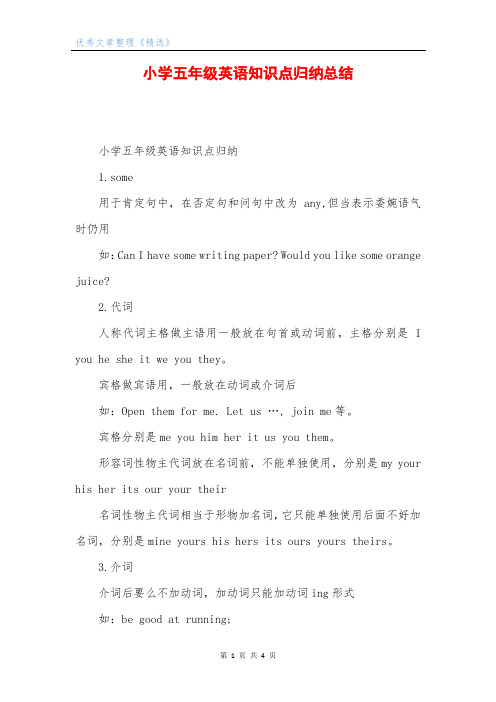
小学五年级英语知识点归纳总结小学五年级英语知识点归纳1.some用于肯定句中,在否定句和问句中改为any,但当表示委婉语气时仍用如:Can I have some writing paper? Would you like some orange juice?2.代词人称代词主格做主语用一般放在句首或动词前,主格分别是 I you he she it we you they。
宾格做宾语用,一般放在动词或介词后如:Open them for me. Let us …, join me等。
宾格分别是me you him her it us you them。
形容词性物主代词放在名词前,不能单独使用,分别是my your his her its our your their名词性物主代词相当于形物加名词,它只能单独使用后面不好加名词,分别是mine yours his hers its ours yours theirs。
3.介词介词后要么不加动词,加动词只能加动词ing形式如:be good at running;第1页共4页do well in jumping;4.时间介词季节前,月份前用介词in如:in summer;in March具体的哪一天如星期几,几月几日用介词on如:on Saturday; on the second of April; on Wednesday morning在几点钟前用介词at如:at a quarter to four;只在上下午晚上用in如:in the morning/ afternoon/ evening;但在夜间用at night。
另:季节,月份和星期前不好加the.5.名词复数构成的(方法)有规则的有:(1)直接在名词后加s如orange—oranges; photo—photos;(2) 以x, s, sh, ch 结尾的加es如:box—boxes; glass—glasses; waitress—waitresses; watch—watches;peach--peaches(3) 以辅音字母加y结尾的改y为i加es如:study—studies;library—libraries; hobby—hobbies;family—families;(4)以f, fe结尾的改f, fe 为v+es如:knife—knives; thief —thieves(注:以o结尾的我们学过的只有mango加es, mango—mangoes其余加s,)不规则的有:man—men; woman—women; people—people; child—children 6.动词第三人称单数的构成(1)直接在动词后加s如:run—runs; dance—dances(2)以s,sh,ch,o结尾的加es如:do—does;go—goes;wash—washes;catch—catches(3)以辅音字母加y结尾的改y为i加es如:study—studies; carry—carries;小学五年级英语知识点(总结)人称代词、名词所有格及序数词1、主格用来作句中的主语,用于动词前面。
小学五年级英语主要知识点有哪些
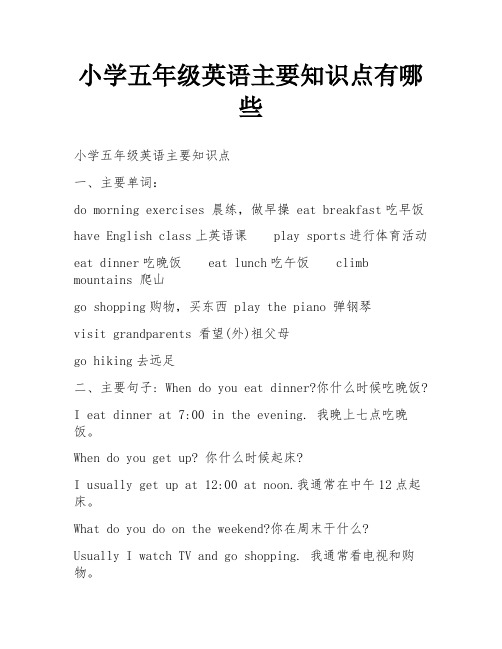
小学五年级英语主要知识点有哪些小学五年级英语主要知识点一、主要单词:do morning exercises 晨练,做早操 eat breakfast吃早饭have English class上英语课play sports进行体育活动eat dinner吃晚饭eat lunch吃午饭climb mountains 爬山go shopping购物,买东西 play the piano 弹钢琴visit grandparents 看望(外)祖父母go hiking去远足二、主要句子: When do you eat dinner?你什么时候吃晚饭?I eat dinner at 7:00 in the evening. 我晚上七点吃晚饭。
When do you get up? 你什么时候起床?I usually get up at 12:00 at noon.我通常在中午12点起床。
What do you do on the weekend?你在周末干什么?Usually I watch TV and go shopping. 我通常看电视和购物。
Sometimes I visit my grandparents.有时候我去看望我的外祖父母。
I often play football. 我经常踢足球。
Sometimes I go hiking.有时候我去远足。
三、同义词eat breakfast—have breakfast eat lunch—have lunch eat dinner—have dinner play sports—do sportsusually—often复数形式:policeman—policemen policewoman—policewomen现在分词:tell—telling三单:say—says同义句:What do you do ? ---What are you? 你是干什么的?四、表示频度的副词:always 总是,一直usually 通常,常常often 经常sometimes 有时候五、以复数形式出现的词组:visit grandparents plant trees六、介词后跟表示时间的词语时,表示在某年、某月、某个季节,某个时候(在上午,在下午,在晚上)用in;表示在某一天,在星期几用on,在具体的几点几分用at.七、too 和either的用法区别:too和either都是“也”的意思,但too用于肯定句,either用于否定句。
小学五年级重点知识归纳情态动词的用法与句型构造
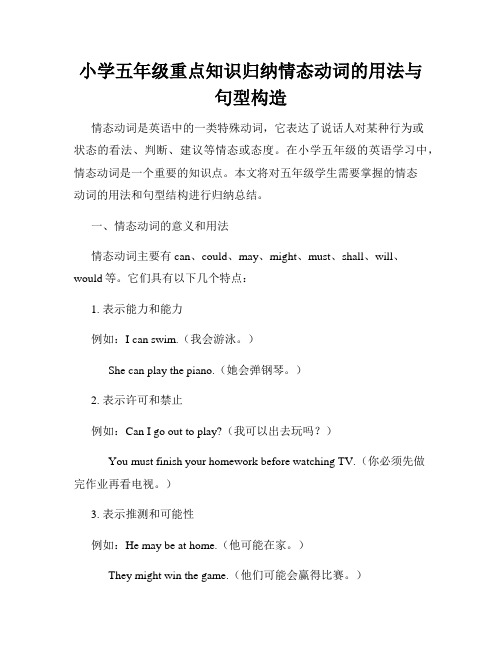
小学五年级重点知识归纳情态动词的用法与句型构造情态动词是英语中的一类特殊动词,它表达了说话人对某种行为或状态的看法、判断、建议等情态或态度。
在小学五年级的英语学习中,情态动词是一个重要的知识点。
本文将对五年级学生需要掌握的情态动词的用法和句型结构进行归纳总结。
一、情态动词的意义和用法情态动词主要有can、could、may、might、must、shall、will、would等。
它们具有以下几个特点:1. 表示能力和能力例如:I can swim.(我会游泳。
)She can play the piano.(她会弹钢琴。
)2. 表示许可和禁止例如:Can I go out to play?(我可以出去玩吗?)You must finish your homework before watching TV.(你必须先做完作业再看电视。
)3. 表示推测和可能性例如:He may be at home.(他可能在家。
)They might win the game.(他们可能会赢得比赛。
)4. 表示意愿和请求例如:I will help you.(我会帮助你。
)Could you pass me the pen, please?(请你给我递一支笔,好吗?)二、情态动词的句型构造1. 肯定句情态动词后面直接跟动词原形。
例如:He can swim.(他会游泳。
)They will come tomorrow.(他们明天会来。
)2. 否定句在情态动词后面加not。
例如:I cannot play basketball.(我不能打篮球。
)She will not go to the party.(她不会参加聚会。
)3. 疑问句将情态动词放在句子的开头。
例如:Can you help me?(你能帮助我吗?)Will she come to the concert?(她会来听音乐会吗?)4. 一般疑问句回答主语+情态动词。
小学五年级英语语法重点知识归纳

小学五年级英语语法重点知识归纳4:“any”一些;用在否定句和一般疑问句中,与“some”同义;“some”用在肯定句中;5:there be句型,采用“就近原则”;8:can 后+动词原形;9:play+the+乐器; play+球类;Let’s句型,让我们,后接动词原形fish,sheep单复数一样1、反义词:tall—short long—short young—old new—old strong—thin fa t—thinkind—strict active—quiet2、What’s …like 是问某某长得什么样子,它的答语一般用:He/She/ It is…后面跟描写人的外貌特征的词语,如:What’s your father like 你爸爸长得什么样子;而like的另一个意思“喜欢”;如:What does your father like 你爸爸喜欢什么3、表示“一个”有;a, e, i,o, u开头一般用an,例如an old lady;an active lady第二单元:1、表示星期几的七个单词,开头第一个字母都要大写;Weekend周末指周六和周日2、on+星期;如on Monday, on Sunday . 表示在几点几分,用at. 如at 6:30;3、with和…一起,with后面常用人称代词的宾格形式;如:I can play ping-pong with you.我可以和你一起打乒乓球I can playping-pong with him. I can play ping-pong with her .him他、her她; 4、I like Sundays.是指所有的星期日,所以用复数形式;I’d=I would2、some与any的区别:any用在否定句、疑问句;例如:There isn’t any……There aren’t any……或者Are there any…… some用在肯定句;3、 tomato 和potato 的复数形式在后面加es, tomatoes, potatoes; 第五六单元1.There be句型包括There is a …后面跟名词单数,表示一个;例如:There are some…后面跟名词复数,表示多个;There are many…后面跟名词复数,表示多个;2. on与over的区别on: 在;;;上面,表示与下面的物体相互接触,紧挨着;over: 在;;;上方,表示与下面的物体没有接触,悬空着;3.疑问词:what,where ,who,what time,who whose when how how many1 what 什么, What’s this 这是什么What’s your name 你的名字是什么What’s your father like 你爸爸长得什么样子What’s your mother 你妈妈是干什么的2where 哪里,如Where are you 你来自哪里 Where is your ruler 尺子在哪里呢3who 谁; 用来问人物是谁如Who’s that man 那个男人是谁4whose 谁的,如:Whose book is this 这是谁的书5 what time 什么时间,用来问具体的时间是几点6what colour 什么颜色,用来问物体是什么颜色的;7when 什么时候, 用来问时间,后面常跟动词; 如:When do you get up 8 how 怎么样如:How are you 你好吗9how many 多少;用来问物体的数量; 如:How many books do you have 你有多少本书10how much 多少钱;用来问商品或者物体的价格;如:How much is your schoolbag 7. 以Is, Are,Can, Do,Does 等开头的问句是一般疑问句;如: Is your sister a teacher Yes, she is. / No, she isn’t.Are you a student Yes, I am. / No, I’m not. Doyou have new teachers Yes, we do. / No, we don’t.Can you wash the clothes Yes, I can. / No, I can’t.on 与above的区别:on在…上面;表示与下面的物体互相接触,紧挨着;above 在…上方,表示与下面的物体不接触,两个物体之间有一定的距离;1.Beis, am, are 的用法口诀be动词am is are ;我I用am,你you用are; is连着他,她,它he, she, it; 我们,你们和他们we, you, they,全部都用are 2. be like与do like: What’s…like 是问”某某长什么样子”的意思;它的答语一般用He/She/ It is…后面跟描写人的外貌特征的词语;而在What does … like 的句子中,like是“喜欢”的意思;如:What does your father like 你的爸爸喜欢什么它的答语是He/She/ It likes…后面跟喜欢的东西;Unit 2 My week星期一到星期天,首字母要大写;Monday 星期一Tuesday星期二Wednesday星期三Thursday星期四1. 描述人的外貌单词old 年老的young年轻的tall 高的short 矮的strong 强壮的thin 瘦的 2.描述人的性格的单词funny滑稽的kind 和蔼的strict严格的polite 有礼貌的hard-working 工作努力的helpful 能干的clever 聪明的shy 害羞的3.其他单词sometimes有时will 将要know 知道robot机器人finish 完成he’s=he is 他是who’s=who is谁是Mr先生Miss 小姐Ms 女士speak English 说英语y i baby 婴儿happy 高兴windy 刮风的sunny 晴朗的sorry 抱歉句型Ms Wang will be our new Chinese teacher.王女士是我们新语文老师What’s she like 她怎么样She’s very kind.她很和蔼;Is she strict 她严格吗Yes, sometimes.是的,有时候. | Do you know Mr Young 你认识杨先生吗No,I don’t .不,不认识; Yes,I do是的,我认识;Who is your maths teacher 谁是你的数学老师Mr Li李先生;Is he funny 他搞笑吗Yes,he is.是的,他搞笑;No,he isn’t.不,不搞笑;1.Beis, am, are 的用法口诀be动词am is are ;我I用am,你you用are; is连着他,她,它he, she, it; 我们,你们和他们we, you, they,全部都用are2. be like与do like:What’s…like 是问”某某长什么样子”的意思;它的答语一般用:He/She/ It is…后面跟描写人的外貌特征的词语;而在What does … like 的句子中,like是“喜欢”的意思;如:What does your father like 你的爸爸喜欢什么它的答语是He/She/ It likes…后面跟喜欢的东西;Unit 2 My week星期一到星期天,首字母要大写;Monday 星期一Tuesday星期二Wednesday星期三Thursday星期四Friday星期五Saturday星期六Sunday星期日weekend 周末often通常cooking烹饪tired疲惫的should 应该schedule 日程安排短语wash my clothes洗衣服watch TV看电视do homework做家庭作业read books读书play football踢足球play sports做体育运动every day每一天do housework做家务语音ee i: feet 脚beef 牛肉meet 见面ea i: tea 茶read 阅读eat 吃句型What do you have on Thursdays 星期四你有什么课I have maths, English and music.我有数学课,英语课和音乐课; What do you do on Wednesdays 你星期三都在做什么I often do my homework . 我通常在写我的家庭作业;What do you often do on the weekend 你周末常干什么I often watch TV.我常看电视.Sometimes I read books. 有时候我看书;Do you often read books in this park 你常常在这个公园读书吗No, I don’t.不,我不经常在这看书; Yes, I do. 是的;我经常;What do we have on Wednesdays 星期三我们都有什么课We have English、science and computer on Wednesdays.我们星期三有英语、科学和计算机;What day is it today 今天是星期几It’s Monday.今天是星期一;You look tired. 你看起来很累;You should play sportseveryday. 你应该每天做运动;1. 合成词:两个简单的单词放在一起,变成一个新的单词,如:bedroom,classroom 2. in, on ,at 后面跟表示时间的词语时,1在上午,下午,晚上用in.如in the morning, in the afternoon, in the evening.2表示在某日,在星期几时,用on;如on Monday, on Sunday .3表示在几点几分,在几点时,用at. 如at 6:30, at 9 o’clock.What do you have on Mondays 周一你们都有什么课We have Chinese, English, math and science on Mondays. What do you do on Mondays 周一你都做什么I often do homework, read books and watch TV.Unit 3 What would you like 1.食品类hungry 饿的时候吃eatsandwich三明治salad沙拉hamburger汉堡包ice cream冰淇淋2.饮料类thirsty 渴的时候喝drinktea茶milk牛奶juice果汁 water 水3.形容味道类单词fresh新鲜的healthy 健康的delicious美味的hot辣的sweet 甜的4.其他类drink喝thirsty渴的favourite最喜欢的food食物onion洋葱语音ow au cow 奶牛flower 花WOW 哇down 向下ow əʊ slow 慢的snow 雪yellow 黄色window 窗户句型What’s your favorite food 你最喜欢的食物是什么My favourite food is fish.我最喜欢的食物是鱼;What would you like to eat 你想吃什么I’d like some noodles我想吃面条;What would you like to drink 你想喝什么I’d like some water. I’m thirsty我要一些水,我渴了;My favorite foot is ice cream .It is sweet. 我最喜欢的食物是冰淇淋,它很甜;I don’t like beef but chicken is OK我不喜欢牛肉但是鸡肉可以;I like vegetables but not carrots我喜欢蔬菜,但是不喜欢胡萝卜; 语法点1.吃饭时,询问他人想吃和想喝什么时,----What would you like to eat/drink 你想要吃/喝什么----I’d like a sandwich/hamburger/ an egg, please我想要一个三明治/汉堡/蛋.tea/milk/juice/water, please. 我想要点茶/牛奶/果汁/水;注意:可数的食物也可以在前面加上数字,表示几个,如:I’d like two hamburgers/three sandwiches/five hot dogs, please.我想要两个汉堡/三个三明治/五个热狗.2.当你想知道你朋友或父母最爱吃的食物或最爱喝的东西是什么时,---What’s your favourite food/dr ink---Ice cream. It’s sweet./ Juice. It’s healthy.3.单词的复数形式1一般情况下,在单词后面直接加s;2以o, s, x, ch, sh结尾的单词,加es;3people, fish,sheep单数形式和复数形式一样,不加s.Unit 4 What can you do 签字:单词dance跳舞cook烹饪swim游泳we’ll=we will party聚会next 下一个wonderful极好的learn学习any若干no problem没问题want想要send邮寄Email电子邮件短语sing English songs唱英文歌曲play the pipa弹琵琶do kung fu 练武术draw cartoons画漫画play basketball打篮球play ping-pong打乒乓球speak English说英语语音oo u book 书look 看football 足球good 好oo u: balloon 气球food 食物zoo 动物园noodles 面条句型当举办宴会时,调查同学们会什么时,可以这样问:---What can you do for the party 你能为聚会做什么---I can dance/do kung fu/ play the pipa. 我会跳舞/打武术/弹琵琶;----Wonderful极好的;---Can you swim/cook/play ping-pong 你会游泳/烹饪/打乒乓球吗----Yes.,I can. 是的,我会;/ No, I can’t.不,我不会;---I can’t do any kung fu . 我不会武术;---No problem. I can help you. 没问题,我会帮你的;Please send me an email at . 请给我发送电子邮语法点1.乐器名词前要加the,但是球类名词前不加the;play the pipa play the erhu play the piano play the violin play football play basketball play volleyball play ping-pong 2.can的用法陈述句肯定式:主语+can + 动词;m如:I can cook. 我会做饭;陈述句否定式:主语+can +not + 动词;如:I can not / can’t cook. 我不会做饭;句式一般疑问式及回答:Can + 主语+ 动词如:---- Can you cook 你会做饭吗----- Yes, I can./ No, I can’t.会,我会;/不,我不会;特殊疑问式:What + can +主语+do如:What can you do 你会做什么3. some和any 的区别.some用于肯定陈述句中. I can do some kung fu.any 用于否定句和疑问句中. I can’t do any kung fu.Unit 5 There is a big bed. 签字:单词和短语clock时钟plant植物water bottle水瓶bike自行车photo相片in front of在…前面between在…之前above在…上面beside 在旁边behind在…后面there表示存在或发生grandparents 祖父母lots of大量flower 花move 搬家dirty肮脏的live居住everywhere处处ai ei rainy 下雨的rainbow 彩虹paint 涂wait 等待ay ei say 说way 路birthday 生日Monday 星期一句型What’s in your room 你的房间里有什么There is a nice photo in my room.我的房间有一张好看的照片; My computer is on the desk. 我的电脑在桌子上;There are so many pictures and plants here .这里有这么多画和植物;My grandparents have a garden in front of their house.我的祖父母的房子前面有一个花园;I just moved into an old house. 我刚搬进了一个老房子里;I see a mouse behind my computer. 我看见了一只老鼠在我的电脑后面;I live near the nature park. 我住在自然公园旁边;语法点1.there be句型又叫“存在句型”,表示在某地有某物,包括:1单数形式there is a/an +名词单数+地点,表示在某地有一个….如:There is a clock/bike/photo/plant/water bottle beside/on/behind/….…旁边/上面/后面有一个钟/自行车/相片/水瓶There is an apple/egg beside/on/behind/….…旁边/上面/后面有一个苹果/鸡蛋2复数形式两个及以上的There are +具体数字two/three/many/some+名词复数+地点,表示有多个如:There are two bikes in front of the house. 房子前有两辆自行车;There are some buildings in the park. 公园里有一些建筑; There are many trees in the forest. 森林里有许多树;2.there be 句型中使用单数句式还是复数句式遵循”就近原则”;3. have/ has 用于表达某人拥有某物.I have three pens and she has one pen.4Unit 6 In a nature parkUnit 6 In a nature park 签字:单词forest森林river河流lake湖泊mountain高山hill山丘tree 树bridge桥building 建筑物village乡村house房子go boating 划船rabbit兔子high高的aren’t = are not isn’t = is not nature park 自然公园语音ou au house 房子mouse 老鼠sound 声音count 数句型Is there a river in the forest 森林里有条河流吗Yes, there is.是的,有; No, there isn’t.不,没有;Are there any tall buildings in your village 你的村庄里有高楼吗Yes, there are 是的,有些; No, there aren’t.不,没有;The nature park is so quiet. 这自然公园好安静;There aren’t many people . 这里没有很多人;注意:any用在疑问、否定句中,some用在肯定句中;语法点1.当询问“这里有什么吗”时,只需要把There is… 变成Is there… There are…变成Are there... 如:1There is a river/hill/forest/lake/mountain.这里有一条河/一座小山/一片森林/一座高山;Is there a river/hill/forest/lake/mountain这里有一条河/一座小山/一片森林/一座高山吗肯定回答:Yes, there is. 否定回答:No,there isn’t.2 There are four bridges/villages. 这里有四架桥/四个村庄Are there four bridges/villages 这里有四架桥/四个村庄吗肯定回答:Yes, there are. 否定回答:No,there aren’t.2. some和any 的区别.some用于肯定陈述句中. There are some houses in thevillage. any 用于否定句和疑问句中. Are there any houses in the village No, there aren’t any houses in the village.。
小学五年级英语知识点归纳
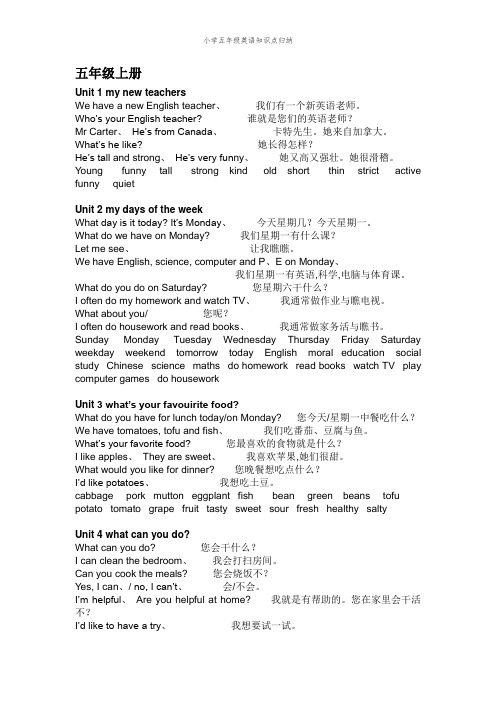
五年级上册Unit 1 my new teachersWe have a new English teacher、我们有一个新英语老师。
Who’s your English teacher?谁就是您们的英语老师?Mr Carter、He’s from Canada、卡特先生。
她来自加拿大。
What’s he like?她长得怎样?He’s ta ll and strong、He’s very fun ny、她又高又强壮。
她很滑稽。
Young funny tall strong kind old short thin strict active funny quietUnit 2 my days of the weekWha t day is it today? It’s Monday、今天星期几?今天星期一。
What do we have on Monday? 我们星期一有什么课?Let me see、让我瞧瞧。
We have English, science, computer and P、E on Monday、我们星期一有英语,科学,电脑与体育课。
What do you do on Saturday? 您星期六干什么?I often do my homework and watch TV、我通常做作业与瞧电视。
What about you/ 您呢?I often do housework and read books、我通常做家务活与瞧书。
Sunday Monday Tuesday Wednesday Thursday Friday Saturday weekday weekend tomorrow today English moral education social study Chinese science maths do homework read books watch TV play computer games do houseworkUnit 3 what’s your favouirite food?What do you have for lunch today/on Monday? 您今天/星期一中餐吃什么?We have tomatoes, tofu and fish、我们吃番茄、豆腐与鱼。
五年级英语知识点整理归纳
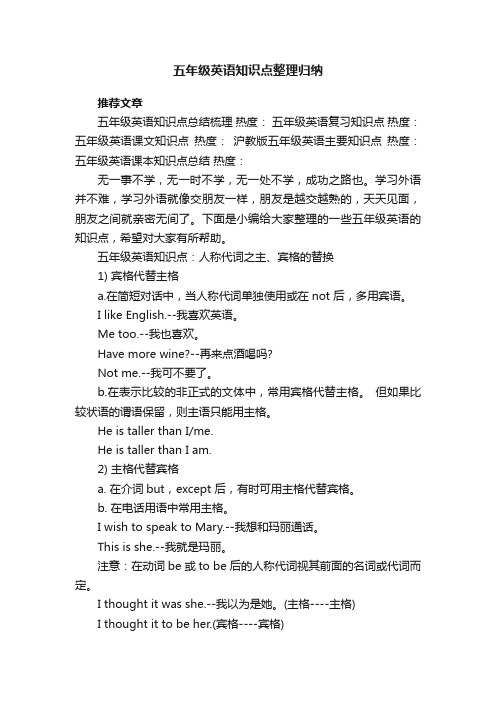
五年级英语知识点整理归纳推荐文章五年级英语知识点总结梳理热度:五年级英语复习知识点热度:五年级英语课文知识点热度:沪教版五年级英语主要知识点热度:五年级英语课本知识点总结热度:无一事不学,无一时不学,无一处不学,成功之路也。
学习外语并不难,学习外语就像交朋友一样,朋友是越交越熟的,天天见面,朋友之间就亲密无间了。
下面是小编给大家整理的一些五年级英语的知识点,希望对大家有所帮助。
五年级英语知识点:人称代词之主、宾格的替换1) 宾格代替主格a.在简短对话中,当人称代词单独使用或在not 后,多用宾语。
I like English.--我喜欢英语。
Me too.--我也喜欢。
Have more wine?--再来点酒喝吗?Not me.--我可不要了。
b.在表示比较的非正式的文体中,常用宾格代替主格。
但如果比较状语的谓语保留,则主语只能用主格。
He is taller than I/me.He is taller than I am.2) 主格代替宾格a. 在介词but,except 后,有时可用主格代替宾格。
b. 在电话用语中常用主格。
I wish to speak to Mary.--我想和玛丽通话。
This is she.--我就是玛丽。
注意:在动词be 或to be 后的人称代词视其前面的名词或代词而定。
I thought it was she.--我以为是她。
(主格----主格)I thought it to be her.(宾格----宾格)I was taken to be she.--我被当成了她。
(主格----主格)They took me to be her.--他们把我当成了她。
(宾格----宾格)五年级英语考试知识点重点句子1. —What do you have on Thursdays? 星期四你们上什么课?—I have math, English and music. 我们上数学、英语和音乐课。
小学五年级英语知识点归纳
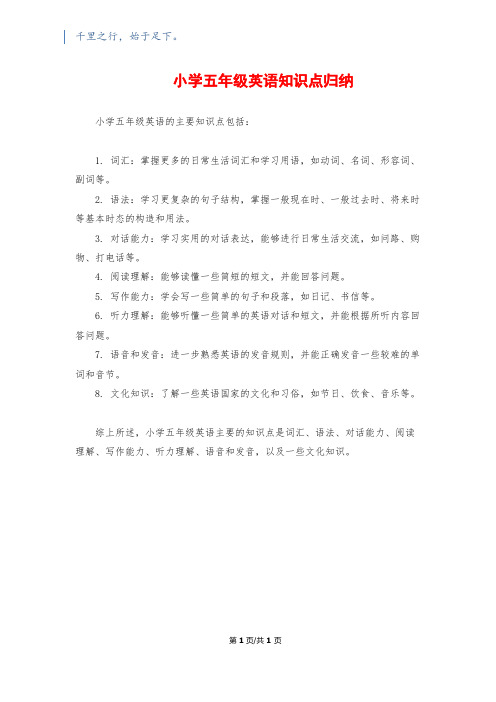
千里之行,始于足下。
小学五年级英语知识点归纳
小学五年级英语的主要知识点包括:
1. 词汇:掌握更多的日常生活词汇和学习用语,如动词、名词、形容词、副词等。
2. 语法:学习更复杂的句子结构,掌握一般现在时、一般过去时、将来时等基本时态的构造和用法。
3. 对话能力:学习实用的对话表达,能够进行日常生活交流,如问路、购物、打电话等。
4. 阅读理解:能够读懂一些简短的短文,并能回答问题。
5. 写作能力:学会写一些简单的句子和段落,如日记、书信等。
6. 听力理解:能够听懂一些简单的英语对话和短文,并能根据所听内容回答问题。
7. 语音和发音:进一步熟悉英语的发音规则,并能正确发音一些较难的单词和音节。
8. 文化知识:了解一些英语国家的文化和习俗,如节日、饮食、音乐等。
综上所述,小学五年级英语主要的知识点是词汇、语法、对话能力、阅读理解、写作能力、听力理解、语音和发音,以及一些文化知识。
第1页/共1页。
小学五年级英语下册《Unit5 Whose dog is it》知识点归纳
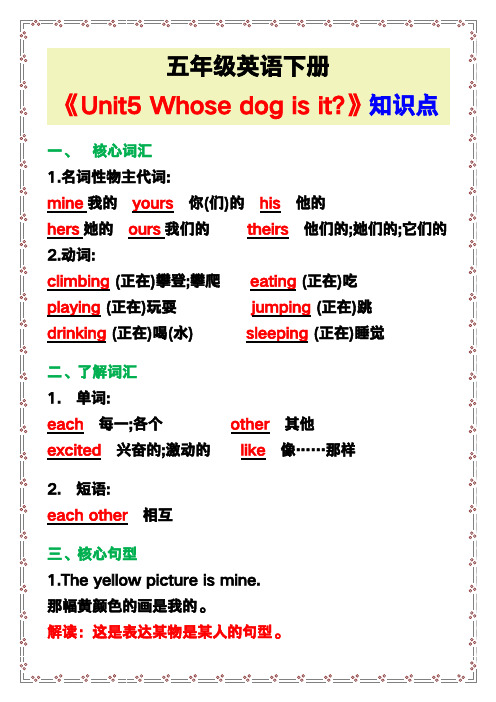
是张鹏的。
解读:当表示物品的从属关系时用名词性物主代词或名词所有格来表示。
4.—Is he drinking water?
他在喝水吗?
—No, he isn’t. He’s eating.
不,不是。他在吃东西。
解读:现在进行时的基本结构是be动词(am/is/are) +现在分词。
举一反三:This bag is hers.这个包是她的。
2.Are these all ours?
这些都是我们的画吗?
解读:这是询问某物是不是某人的一般疑问句。
举一反三:—Is the pencil yours?这是你的铅笔吗?
—Yes, it is.是的。
3.—Whose is it?
它是谁的?
四、了解句型
1.Robin is excited.罗宾非常兴奋。
解读:excited意思是“兴奋的”。一般用来修饰人。
2.I我在像熊一样跳舞。
解读:句中like是介词,意思是“像……那样”。
3.I like flying.我喜欢飞。
解读:like作动词,意思是“喜欢”,如like doing sth./like to do sth.喜欢做某事。
举一反三:—Is the tiger running?老虎在跑吗?
—No, it isn’t.不,不是。
人称代词表
名称
主格
宾格
形容词性
物主代词
名词性
物主代词
人
称代词
I(我)
me(我)
my(我的)
mine(我的)
you(你;你们)
you(你;你们)
your(你的;你们的)
小学五年级英语语法知识点总结
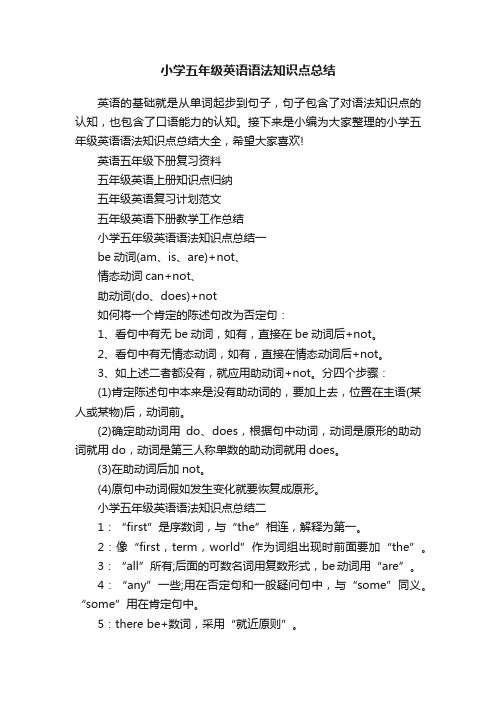
小学五年级英语语法知识点总结英语的基础就是从单词起步到句子,句子包含了对语法知识点的认知,也包含了口语能力的认知。
接下来是小编为大家整理的小学五年级英语语法知识点总结大全,希望大家喜欢!英语五年级下册复习资料五年级英语上册知识点归纳五年级英语复习计划范文五年级英语下册教学工作总结小学五年级英语语法知识点总结一be动词(am、is、are)+not、情态动词can+not、助动词(do、does)+not如何将一个肯定的陈述句改为否定句:1、看句中有无be动词,如有,直接在be动词后+not。
2、看句中有无情态动词,如有,直接在情态动词后+not。
3、如上述二者都没有,就应用助动词+not。
分四个步骤:(1)肯定陈述句中本来是没有助动词的,要加上去,位置在主语(某人或某物)后,动词前。
(2)确定助动词用do、does,根据句中动词,动词是原形的助动词就用do,动词是第三人称单数的助动词就用does。
(3)在助动词后加not。
(4)原句中动词假如发生变化就要恢复成原形。
小学五年级英语语法知识点总结二1:“first”是序数词,与“the”相连,解释为第一。
2:像“first,term,world”作为词组出现时前面要加“the”。
3:“all”所有;后面的可数名词用复数形式,be动词用“are”。
4:“any”一些;用在否定句和一般疑问句中,与“some”同义。
“some”用在肯定句中。
5:there be+数词,采用“就近原则”。
6:a map of China 与 a map of the world 要牢记。
7:要用“on the wall”,不能用“in the wall”。
门、窗在墙上才能用“in the wall”。
8:can 后+动词原形。
9:play+the+乐器; play+球类;10:like的用法11:动词变动名词形式方法:A--直接在动词后面+ing形式(大多数)。
B--以不发音的“e”结尾的,要去掉e后再+ing,比如:dancing,making,riding。
小学五年级英语语法知识点总结
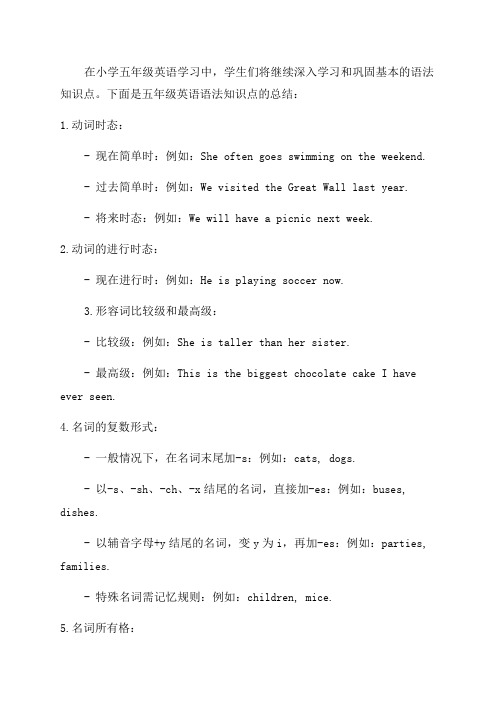
在小学五年级英语学习中,学生们将继续深入学习和巩固基本的语法知识点。
下面是五年级英语语法知识点的总结:1.动词时态:- 现在简单时:例如:She often goes swimming on the weekend.- 过去简单时:例如:We visited the Great Wall last year.- 将来时态:例如:We will have a picnic next week.2.动词的进行时态:- 现在进行时:例如:He is playing soccer now.3.形容词比较级和最高级:- 比较级:例如:She is taller than her sister.- 最高级:例如:This is the biggest chocolate cake I have ever seen.4.名词的复数形式:- 一般情况下,在名词末尾加-s:例如:cats, dogs.- 以-s、-sh、-ch、-x结尾的名词,直接加-es:例如:buses, dishes.- 以辅音字母+y结尾的名词,变y为i,再加-es:例如:parties, families.- 特殊名词需记忆规则:例如:children, mice.5.名词所有格:- 单数名词所有格:例如:My father's car is blue.- 复数名词所有格:例如:The students' books are on the desk.- 名词所有格为人名时,只需在末尾加-‘s:例如:Tom's hat is on the bed.6.代词:- 主格代词:例如:I, you, he, she, we, they.- 宾格代词:例如:me, you, him, her, us, them.- 物主代词:例如:mine, yours, his, hers, ours, theirs.- 反身代词:例如:myself, yourself, himself, herself, ourselves, themselves.7.副词的比较级和最高级:- 比较级:例如:He runs faster than his friend.- 最高级:例如:She is the fastest runner in the class.8.介词短语:- 介词短语用来描述时间、地点或方向等:例如:in the park, on the table, to the cinema.- 常见的介词有:in, on, at, to, from, with, by等。
小学五年级英语语法知识点总结大全
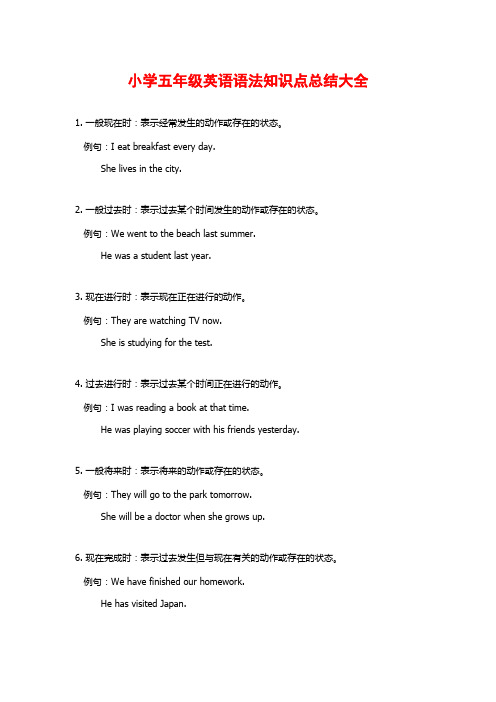
小学五年级英语语法知识点总结大全1. 一般现在时:表示经常发生的动作或存在的状态。
例句:I eat breakfast every day.She lives in the city.2. 一般过去时:表示过去某个时间发生的动作或存在的状态。
例句:We went to the beach last summer.He was a student last year.3. 现在进行时:表示现在正在进行的动作。
例句:They are watching TV now.She is studying for the test.4. 过去进行时:表示过去某个时间正在进行的动作。
例句:I was reading a book at that time.He was playing soccer with his friends yesterday.5. 一般将来时:表示将来的动作或存在的状态。
例句:They will go to the park tomorrow.She will be a doctor when she grows up.6. 现在完成时:表示过去发生但与现在有关的动作或存在的状态。
例句:We have finished our homework.He has visited Japan.7. 过去完成时:表示过去某个时间之前已经发生的动作。
例句:I had already eaten dinner when they arrived.She had studied for the test before she took it.8. 一般将来时:表示将来某个时间将要发生的动作或存在的状态。
例句:We will be having a party next week.They will be traveling around the world.9. 一般将来时:表示将来某个时间将要发生的动作或存在的状态。
pep五年级英语语法知识点归纳
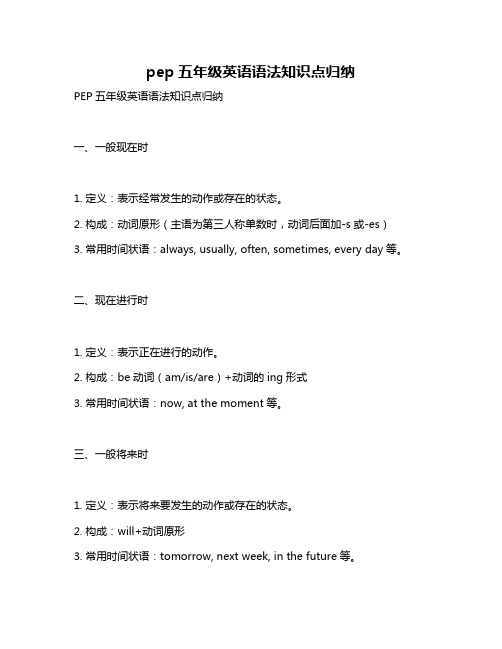
pep五年级英语语法知识点归纳
PEP五年级英语语法知识点归纳
一、一般现在时
1. 定义:表示经常发生的动作或存在的状态。
2. 构成:动词原形(主语为第三人称单数时,动词后面加-s或-es)
3. 常用时间状语:always, usually, often, sometimes, every day等。
二、现在进行时
1. 定义:表示正在进行的动作。
2. 构成:be动词(am/is/are)+动词的ing形式
3. 常用时间状语:now, at the moment等。
三、一般将来时
1. 定义:表示将来要发生的动作或存在的状态。
2. 构成:will+动词原形
3. 常用时间状语:tomorrow, next week, in the future等。
四、一般过去时
1. 定义:表示过去的动作或存在的状态。
2. 构成:动词的过去式
3. 常用时间状语:yesterday, last week, three years ago等。
五、形容词的比较级和最高级
1. 比较级:表示“更……”,形容词后面加-er。
形容词比较级前可以用more修饰。
2. 最高级:表示“最……”,形容词后面加-est。
形容词最高级前通常用the修饰,前面加most修饰。
3. 表示倍数关系的比较级:be twice the size of…(是……的两倍大)等。
小学五年级英语语法知识点总结大全
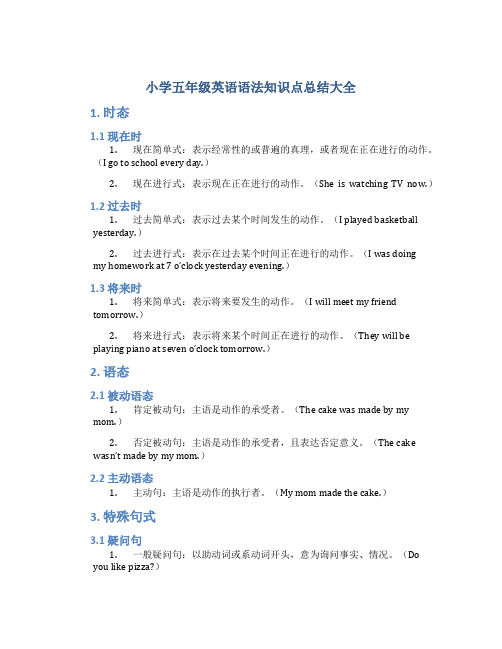
小学五年级英语语法知识点总结大全1. 时态1.1 现在时1.现在简单式:表示经常性的或普遍的真理,或者现在正在进行的动作。
(I go to school every day.)2.现在进行式:表示现在正在进行的动作。
(She is watching TV now.)1.2 过去时1.过去简单式:表示过去某个时间发生的动作。
(I played basketball yesterday.)2.过去进行式:表示在过去某个时间正在进行的动作。
(I was doingmy homework at 7 o’clock yesterday evening.)1.3 将来时1.将来简单式:表示将来要发生的动作。
(I will meet my friend tomorrow.)2.将来进行式:表示将来某个时间正在进行的动作。
(They will be playing piano at seven o’clock tomorrow.)2. 语态2.1 被动语态1.肯定被动句:主语是动作的承受者。
(The cake was made by my mom.)2.否定被动句:主语是动作的承受者,且表达否定意义。
(The cake wasn’t made by my mom.)2.2 主动语态1.主动句:主语是动作的执行者。
(My mom made the cake.)3. 特殊句式3.1 疑问句1.一般疑问句:以助动词或系动词开头,意为询问事实、情况。
(Do you like pizza?)2.特殊疑问句:以疑问词作为开头,意为询问特定事物或情况。
(What do you want for breakfast?)3.2 祈使句表示请求、劝告或命令。
(Do your homework now.)3.3 感叹句表示强烈的感情或感叹。
(What a beautiful flower!)4. 词汇4.1 名词1.可数名词:表示可以数出来的事物,前面可以加a, an或者数字。
小学五年级英语重要的知识点归纳
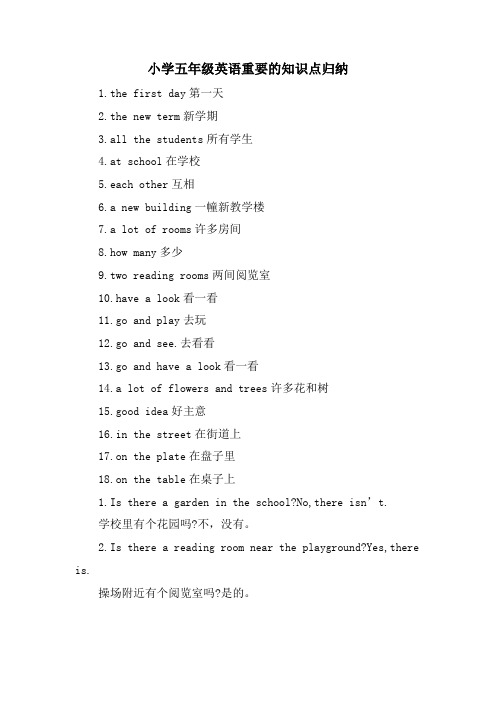
小学五年级英语重要的知识点归纳1.the first day第一天2.the new term新学期3.all the students所有学生4.at school在学校5.each other互相6.a new building一幢新教学楼7.a lot of rooms许多房间8.how many多少9.two reading rooms两间阅览室10.have a look看一看11.go and play去玩12.go and see.去看看13.go and have a look看一看14.a lot of flowers and trees许多花和树15.good idea好主意16.in the street在街道上17.on the plate在盘子里18.on the table在桌子上1.Is there a garden in the school?No,there isn’t.学校里有个花园吗?不,没有。
2.Is there a reading room near the playground?Yes,there is.操场附近有个阅览室吗?是的。
3.Are there any bookcases near the window?No,there aren’t.窗子附近有一些书橱吗?不,没有。
4.Are there any pictures on the desk?Yes,there are.课桌上有一些图片吗?是的。
5.How many TV rooms are there in the building?There are four.大楼里有几间电视房?有四间。
6.I’m not sure.我不能确定。
小学五年级英语各单元知识点(苏教版)

Unit 1 Goldilocks and the three bears 知识点归纳一、Words 单词1. there (与be连用)有2. hard 硬的3. soft 柔软的4. afraid 害怕的5. beside 在……旁边6. between 在……中间7. bear 熊8. forest 森林9. house 房子10. soup 汤(不可数)11. room 房间12. her 她(宾格)13. really 真的14. then 然后15. find 找到,发现16. their 他/她/它们的17.China 中国18.country 国家19.popular 流行的,受欢迎的二、Phrases词组1 inthe forest在森林里2.a beautiful house一座漂亮的房子3.hungry and thirsty又饿又渴4.some soup一些汤5.too cold/hot/hard/soft 太冷/热/硬/软6. jus tright 正好7.three beds 三张床8. in the room 在房间里9.three bears 三只熊10. in front of her在她前面11.on the chair在椅子上12. a glass of milk一杯牛奶13.have some cakes吃一些蛋糕14. in the kitchen在厨房里15.in the fridge在冰箱里16. find their cousin找到他们的表弟17.in the living room在客厅18.three umbrellas三把雨伞19.beside the window在窗户旁20.in the glass在玻璃杯里21.in the tree在树上22.between the boxes在盒子之间23.have a cold(得了)感冒24.put on your coat穿上你的外套25.Western countries西方国家(复数)26.in China在中国三、Sentences句型1.There is a house in the forest.森林里有一座房子。
(完整版)小学五年级英语语法知识汇总
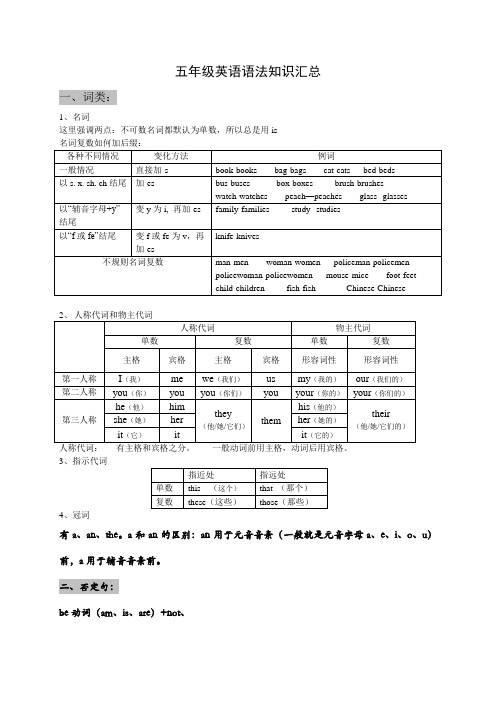
五年级英语语法知识汇总一、词类:1、名词这里强调两点:不可数名词都默认为单数,所以总是用is人称代词:有主格和宾格之分。
一般动词前用主格,动词后用宾格。
3、指示代词4、冠词有a、an、the。
a和an的区别:an用于元音音素(一般就是元音字母a、e、i、o、u)前,a用于辅音音素前。
二、否定句:be动词(am、is、are)+not、情态动词can+ not、助动词(do、does)+ not如何将一个肯定的陈述句改为否定句:1、看句中有无be动词,如有,直接在be动词后+ not。
2、看句中有无情态动词,如有,直接在情态动词后+ not。
3、如上述二者都没有,就应用助动词+ not。
分四个步骤:(1)肯定陈述句中本来是没有助动词的,要加上去,位置在主语(某人或某物)后,动词前。
(2)确定助动词用do、does,根据句中动词,动词是原形的助动词就用do,动词是第三人称单数的助动词就用does,(3)在助动词后加not。
(4)原句中动词假如发生变化就要恢复成原形。
强调一点,有some的要考虑是否要用any。
三、一般疑问句。
如何将一个肯定的陈述句改为一般疑问句:1、看句中有无be动词,如有,把be动词提到句首即可。
2、看句中有无情态动词,如有,把情态动词提到句首即可。
3、如上述二者都没有,就应把助动提到句首。
分四个步骤:(1)肯定陈述句中本来是没有助动词的,要加上去,位置在主语(某人或某物)后,动词前。
(2)确定助动词用do还是does,根据句中动词,动词是原形的助动词就用do,动词是第三人称单数的助动词就用does(3)把助动词后提到句首。
(4)原句中动词假如发生变化就要恢复成原形。
强调一点,有some的要考虑是否要用any。
四、特殊疑问句。
表示疑问,有疑问词(在开头),回答有很多种可能。
常用疑问词:五.时态1、一般现在时(1)一般现在时中的be动词:一般用原形:am is aream用于第一人称单数(I);is用于第三人称单数(he she it和其他人名或称谓,如:Ben his sister等);are用于第二人称单数(you)和所有复数(包括第一人称复数we、第二人称复数you;第三人称复数they和其他复数,如the children 、his parents等)。
- 1、下载文档前请自行甄别文档内容的完整性,平台不提供额外的编辑、内容补充、找答案等附加服务。
- 2、"仅部分预览"的文档,不可在线预览部分如存在完整性等问题,可反馈申请退款(可完整预览的文档不适用该条件!)。
- 3、如文档侵犯您的权益,请联系客服反馈,我们会尽快为您处理(人工客服工作时间:9:00-18:30)。
五年级上册Unit 1 my new teachersWe have a new English teacher. 我们有一个新英语老师。
Who’s your English teacher谁是你们的英语老师Mr Carter. He’s from Canada.卡特先生。
他来自加拿大。
What’s he like他长得怎样He’s tall and strong. He’s very fun ny. 他又高又强壮。
他很滑稽。
Young funny tall strong kind old short thin strict active funny quiet Unit 2 my days of the weekWhat day is it today It’s Monday.今天星期几今天星期一。
What do we have on Monday 我们星期一有什么课Let me see. 让我看看。
We have English, science, computer and on Monday.我们星期一有英语,科学,电脑和体育课。
What do you do on Saturday 你星期六干什么I often do my homework and watch TV. 我通常做作业和看电视。
What about you/ 你呢I often do housework and read books. 我通常做家务活和看书。
Sunday Monday Tuesday Wednesday Thursday Friday Saturday weekday weekend tomorrow today English moral education social study Chinese science maths do homework read books watch TV play computer games do houseworkUn it 3 what’s your favouirite foodWhat do you have for lunch today/on Monday 你今天/星期一中餐吃什么We have tomatoes, tofu and fish. 我们吃番茄、豆腐和鱼。
What’s your favorite food你最喜欢的食物是什么I like apples. They are sweet. 我喜欢苹果,他们很甜。
What would you like for dinner 你晚餐想吃点什么I’d like potatoes.我想吃土豆。
cabbage pork mutton eggplant fish bean green beans tofupotato tomato grape fruit tasty sweet sour fresh healthy saltyUnit 4 what can you doWhat can you do 你会干什么I can clean the bedroom. 我会打扫房间。
Can you cook the meals 你会烧饭吗Yes, I can./ no, I can’t.会/不会。
I’m helpful. Are you helpful at home我是有帮助的。
你在家里会干活吗I’d like to have a try.我想要试一试。
empty the trash cook the meals water the flowers sweep the floor wash the window clean the bedroom do housework set the table do the dishes wash the clothes make the beduse a computer put away the clothesplay chessUnit 5 my new roomIs this your bedroom 这是你的房间吗Where is the trash bin 垃圾桶在哪里It’s behind the door.在门后。
What’s it like它什么样子There is a big closet, a new air-conditioner and two end tables.那儿有一个大衣柜、一个新空调和两张床头柜。
air-conditioner curtain trash bin closet mirror end tablebedroom kitchen bathroom living room in on nearunder behind over in front ofUnit 6 in a nature parkThere is a forest in the nature park.. 在自然公园里有一个森林。
There are many small houses in my village. 在我们村庄有许多小房子。
Is there a mountain Yes, there is./ No, there isn’t.有高山吗有的/没有。
Are there any bridges over the river Yes, there are./ No, there aren’t.河上有桥吗有的/没有。
sky cloud mountain river flower grass lake forest pathpark farm village city house bridge tree road building air1. It’s time lunch.2. We do homework in the evening.3. Do you like (read) books4. is today 今天星期几5. Sarah usually plays chess Sunday.6. is the first day of a week.7. we (not have) English on Saturday.8. do you often do on Mondays9. do you have Englishyou like cakes五年级下册Unit 1 This is my dayWhen do you do morning exercises 你几点钟做早操I usually eat breakfast at 7:00. 我通常七点钟吃早饭。
What do you do on the weekend 你周末干什么I often visit my grandparents. 我常常去看望祖父母。
Sometimes I go hiking. 有时候我去远足。
do morning exercises eat breakfast get uphave English class play sports eat dinnerclimb mountains go shopping go hikingvisit grandparents play the pianowhen evening noon weekend usually often sometimes Unit 2 what’s your favourite seasonWhat’s your favourite season =Which season do you like best你最喜欢的季节是什么My favourite season is summer.=I like summer best.我最喜欢夏天。
Why do you like winter 你为什么喜欢冬天Because I can play with snow. 因为我可以在雪里玩。
What’s the weather like in spring春天的天气怎样It’s windy and warm.有风的,很暖和。
Summer is good, but fall is my favourite season.夏天很好,但是秋天才使我最喜欢的季节。
Spring summer fall winter season which why because best swimsleep fly kites skate plant trees make a snowmanUnit 3 when is your birthdayWhen is your birthday 你的生日在什么时候My birthday is in May. 我的生日在五月。
Is your birthday in May, too 你的生日也在五月吗No, my birthday is in April. 不,我的生日在四月。
How many birthdays are there in January 一月里有多少个人过生日When is the National Day 国庆节在什么时候It’s October 1st. 十月一日。
What’s the date 几号January (Jan.) February (Feb.) March (Mar.)April May June July August(Aug.)September(Sept.) October(Oct.) November( Nov.)December(Dec.) birthdayUnit 4 what are you doingWhat are you doing 你在干什么I’m doing the dishes. 我在洗碗碟。
Are you drawing pictures 你在画画吗What’s your father doing你爸爸在干什么He is writing an e-mail. 他在写电子邮件。
Can I speak to Amy 我能找Amy 吗Please hold on. 请稍等。
She’s doing homework in the study. 他正在书房做作业。
Draw pictures cook dinner read a book answer the phone listen to music write a letter clean the room write an e-mail Unit 5 look at the msLook at the tiger! 看老虎!It’s jumping!它在跳!The rabbit is running. 兔子在跑。
